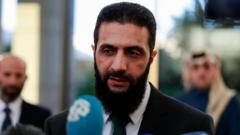The transitional Syrian government has announced changes to the school curriculum, promoting an Islamic perspective and excluding references to the Assad era. These revisions have sparked protests and fears amongst civil society activists regarding their role in shaping the new educational direction as the country moves forward.
Syrian Education Reform Sparks Outcry Amid Curriculum Changes

Syrian Education Reform Sparks Outcry Amid Curriculum Changes
Concerns rise as new Islamist-led authorities implement significant modifications to school curriculums, igniting fears of exclusion and protests ahead of upcoming term.
Amid growing unrest, the recently installed Islamist-led authorities in Syria have rolled out notable changes to the national school curriculum, stirring controversy ahead of the new academic term scheduled to begin on Sunday. The transitional government's education ministry announced via its Facebook platform that the curriculum will adopt a more pronounced Islamic tone, while erasing references to the controversial Assad administration from academic subjects.
Significant adjustments include a shift in terminology; the phrase "Defending the nation" has been substituted with "Defending Allah". Additionally, subjects such as Evolution and the Big Bang theory have reportedly been removed from science classes, and pre-Islamic deities and their representations are no longer featured.
Education Minister Nazir al-Qadri was quick to downplay the scale of these changes, asserting that the curriculum would undergo a thorough review by specialized committees before any definitive alterations are applied. He emphasized that his directive primarily involved the elimination of content glorifying the "defunct Assad regime" and the insertion of the Syrian revolutionary flag into educational materials.
Despite the proposed modifications receiving support from some segments of the Syrian populace, alarm bells have been rung among resurgent civil society advocates. Many of these activists, returning for the first time in many years, fear that their opinions may be disregarded as the transitional government forges ahead with a new direction. Activists have called for protests coinciding with the commencement of the academic year, voicing their dissent against moves by the authorities to implement educational reforms without broad societal input.
The new leadership has positioned itself as inclusive, pledging to engage various communities—ranging from Christians to Kurdish groups—in a comprehensive National Dialogue Conference aimed at fostering a participatory approach to Syria's future.
Yet, many believe the unilateral educational changes contradict these commitments, igniting concerns about the priorities of a new government that was heralded for its potential to champion the values of freedom and inclusion post-Assad.



















